Neuro-Ophthalmology Fellowship
About the Program
The Neuro-Ophthalmology Program at the University of Iowa bridges the fields of ophthalmology and neurology through diagnosis and management of patients with neurological disorders that affect vision and eye movements. Approximately 3,000 clinical neuro-ophthalmology patients are evaluated in the Neuro-Ophthalmology service each year. The evaluations include the entire range of afferent, efferent and pupil abnormalities thereby providing a diverse and challenging fellowship experience.
Purpose and Objectives
The fellowship is designed to provide additional training in neuro-ophthalmology for an ophthalmologist or neurologist who has completed an approved residency. The fellow will be expected:
- to acquire a special expertise in the diagnosis and management of neuro-ophthalmic problems,
- to be able to conduct clinical research in neuro-ophthalmology, and
- to learn how to be an effective teacher of neuro-ophthalmology.
To achieve these goals, the fellow will have to acquire a firm grasp of visual and ocular motor neuroanatomy, the neuropathology of vision and eye movement, the theory, practice, and interpretation of perimetry, electrophysiology of the visual system, and imaging of the eye (including optical coherence tomography). The fellow will also acquire expertise in the reading of CT and MR scans, and achieve a working understanding of the autonomic physiology and pharmacology of the eye.
Terms
The Fellowship is for a 12-month period (unless other arrangements are made). An optional second year is available for those particularly interested in clinical investigations.
One fellow is accepted at a time (with occasional exceptions, more than one fellow may be accepted, when additional funding is available).
The University of Iowa Neuro-Ophthalmology Fellowship program is compliant with Association of University Professors of Ophthalmology (AUPO) Fellowship Compliance Committee (FCC) process described at the link below.
Program Requirements for Fellowship Education in Neuro-Ophthalmology (pdf)
Neuro-Ophthalmology Training
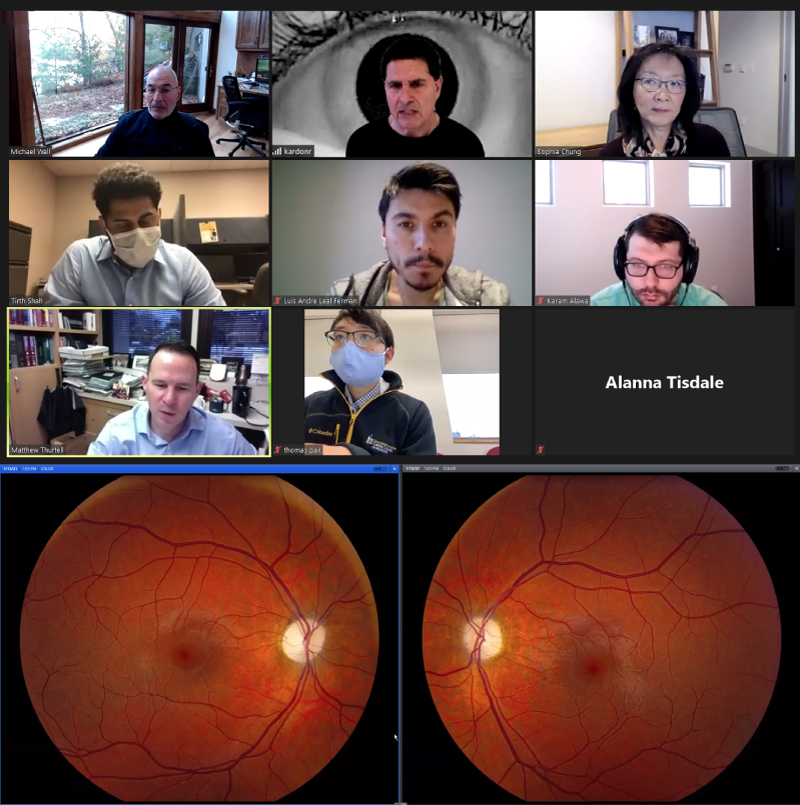 Daily working/teaching rounds are held at 7:30-8 a.m. by Drs. Chung, Kardon, Thurtell, and Wall. These are attended by the fellow, resident(s) (usually two) who are taking a three-month rotation in neuro-ophthalmology, medical students and neurology or neurosurgery residents who are completing a one month rotation on the service. During neuro-ophthalmology daily rounds, the previous day’s clinic patients are discussed, including review and interpretation of visual fields, imaging of the eye and brain, and mechanisms of the disease causing the patient’s problem. Neuro-ophthalmology rounds are an integral part of our fellowship training and is followed by our Ophthalmology Department’s daily Grand Rounds (Monday-Thursday 8-8:45 a.m.). Fellows are expected to make regular interesting case presentations at Department Morning Grand Rounds. The Neuro-ophthalmology service also conducts monthly Neuro-radiology conferences with the Neuro-radiology faculty to discuss the most interesting cases from the previous month who had imaging studies relevant to their diagnosis.
Daily working/teaching rounds are held at 7:30-8 a.m. by Drs. Chung, Kardon, Thurtell, and Wall. These are attended by the fellow, resident(s) (usually two) who are taking a three-month rotation in neuro-ophthalmology, medical students and neurology or neurosurgery residents who are completing a one month rotation on the service. During neuro-ophthalmology daily rounds, the previous day’s clinic patients are discussed, including review and interpretation of visual fields, imaging of the eye and brain, and mechanisms of the disease causing the patient’s problem. Neuro-ophthalmology rounds are an integral part of our fellowship training and is followed by our Ophthalmology Department’s daily Grand Rounds (Monday-Thursday 8-8:45 a.m.). Fellows are expected to make regular interesting case presentations at Department Morning Grand Rounds. The Neuro-ophthalmology service also conducts monthly Neuro-radiology conferences with the Neuro-radiology faculty to discuss the most interesting cases from the previous month who had imaging studies relevant to their diagnosis.
During the fellowship period, the fellow sees patients daily with the residents from 8:45 a.m. to 5 p.m. in the Neuro-ophthalmology Clinic. This clinic is staffed by the neuro-ophthalmology faculty. Every patient is presented to staff and all charts are signed by staff, and the staff are the "doctors of record" for all patients seen in this clinic. The neuro-ophthalmology faculty will examine every patient and will discuss with the fellow each patient that they see. Time is usually allotted to pursue clinical research during the course of the year.
Throughout the year, fellows are encouraged to improve their public speaking and teaching skills by presenting interesting cases to the entire department at morning rounds (see above; 8–8:45 a.m. daily) and at regularly scheduled neuro-ophthalmic demonstrations and inter-departmental conferences. The fellow will take neuro-ophthalmology call every other week with the faculty as back up. In general, it is unusual to be called in after hours.
Research Requirement
Through the year, the fellow is required to undertake an investigative project which can be completed and submitted for publication before the fellowship is over. This is usually a new observation, a case series or report, a prospective study, or a review; it may be in any area of neuro-ophthalmology. The fellow usually presents this research at the annual North American Neuro-ophthalmology Meeting.
The Neuro-ophthalmology Faculty are very active in research funded by the National Institute of Health, the Department of Defense, and the Department of Veterans Affairs, and spend a portion of their schedule on externally funded research. They are committed to enhancing the fellowship training experience by mentoring and guiding research investigations.
The following links to our faculty provide further information about their current research, teaching and clinical interest areas, including external funding:
Faculty Research Interest Summaries
Sophia Chung, MD
Clinical Professor of Ophthalmology and Visual Sciences
Clinical Professor of Neurology
- Laser speckle flowgraphy of the optic nerve
- Clinical neuro-ophthalmology
Randy Kardon, MD, PhD
Pomerantz Family Chair in Ophthalmology
Director, Iowa City VA Center of Excellence for Prevention and Treatment of Visual Loss
Professor of Ophthalmology and Visual Sciences
- Relationship of visual dysfunction to pupillomotor responsiveness to light
- Pharmacology of the central and peripheral pupillomotor pathways
- Autonomic disorders of pupillary function
- Risk factors in the pathogenesis of optic nerve diseases
- Multifocal electroretinogram in diagnosing visual loss
- Correlation of structure and function of the visual system
- Studies of the dynamics of the blood flow to the choroid and retina
- Optical imaging of retinal function
Adriana Rodriguez-Barrath, MD
Assistant Professor of Neurology & Ophthalmology and Visual Sciences
Associate Residency Program Director of Neurology
- Migraine and headache disorders
- Photophobia in migraine and non-migraine conditions
- Idiopathic Intracranial Hypertension and pulsatile synchronous tinnitus
Edward F. Linton, MD
Assistant Professor of Ophthalmology and Visual Sciences
- Smartphone perimetry without eye tracking
- Limitations of using inexpensive available hardware to perform perimetry
- Strategies to circumvent these limitations
- Development of size-modulation perimetry strategy
- Validation of an inexpensive open source VR perimetry platform
- Laser Speckle Flowgraphy in Carotid Cavernous Fistula
- Non-invasive diagnosis
- Correlation of velocity waveform in the eye to pressure waveform in the superior ophthalmic vein
- Identification of biomarkers that predict vision loss
Matthew Thurtell, MBBS, MSc, FRACP
The Captain Jim and Donnita Gross Fund Professor
Director, Neuro-Ophthalmology Service
Associate Professor of Ophthalmology and Visual Sciences
Associate Professor of Neurology
- Eye-movement disorders and their treatment
- Eye movement kinematics
- Clinical neuro-ophthalmology
- Clinical neuro-otology
Michael Wall, MD
Director, Iowa Visual Field Reading Center
Professor of Neurology
Professor of Ophthalmology and Visual Sciences
- Idiopathic Intracranial Hypertension: Etiology and Treatment
- Mechanisms of perimetric variability
- Use of large sized perimetric stimuli
- New perimetric techniques
- Sensory visual system information processing with emphasis on the application of visual physiology and neural networks to development of new clinical visual tests.
Learn more about current research projects
Rounds, Lectures, and Conferences
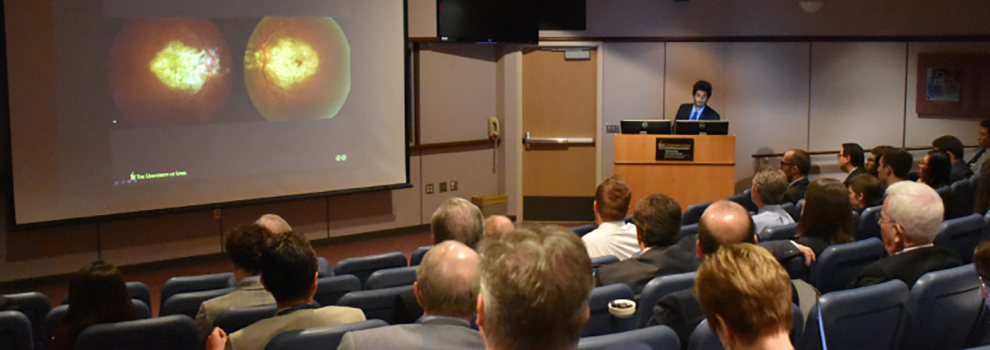
Grand rounds are held Monday through Thursday from 8:00 to 8:45 a.m. in the Braley Auditorium. All residents and staff attend unless operating or engaged in acute medical care. During rounds, residents and fellows develop their public speaking skills by making presentations. Discussion by the faculty and house staff follows each case.
The cases and discussions presented by Residents and Fellows at Grand Rounds are often further developed and published as case reports and tutorials on EyeRounds.org.
Afternoons are, in general, reserved for rotation-specific conferences. Neuro-ophthalmology holds "chart rounds" each day before Grand Rounds. These conferences focus on patients that may present that day. Discussions center on patient care but also cover other areas such as communication, ethics, and systems based care.
Once a week during the academic year, didactic lectures on ophthalmology are presented. These two-hour lectures are organized to coincide with the American Academy of Ophthalmology’s Basic and Clinical Sciences Course. Lectures cover most aspects of basic and clinical ophthalmology. Once every 10 weeks these sessions include a journal club covering recent journal articles in that subject area to help develop skills in practice based learning.
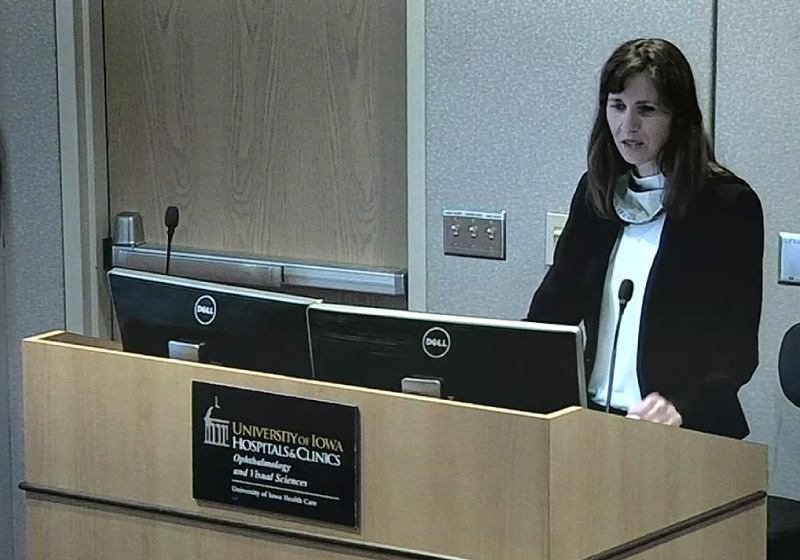 Six, day-long clinical conferences are held during the academic year. Clinics are closed on these days. Ophthalmologists from throughout Iowa and Illinois attend and present challenging clinical problems for discussion by faculty and guests. These meetings feature a visiting professor who presents a lecture based on his/ her research interests. The day is balanced by the presentation of a more clinically oriented topic. This conference has contributed to the excellent rapport between practicing ophthalmologists and the ophthalmology staff at the university.
Six, day-long clinical conferences are held during the academic year. Clinics are closed on these days. Ophthalmologists from throughout Iowa and Illinois attend and present challenging clinical problems for discussion by faculty and guests. These meetings feature a visiting professor who presents a lecture based on his/ her research interests. The day is balanced by the presentation of a more clinically oriented topic. This conference has contributed to the excellent rapport between practicing ophthalmologists and the ophthalmology staff at the university.
Each year in June, alumni and other members attend a two- to three-day Iowa Eye Association meeting with invited speakers and a focus on a specific subspecialty topic.
Presentations of research are made annually during the Resident/Fellow Research Conference at the end of the academic year.
Quick Facts
Benefits
- Competitive Stipends
- Comprehensive medical, dental, hospitalization and pharmacy benefits for residents/fellows and their dependents
- Vacation each year: 3 weeks, for specific information Paid Time Off and Leave Information
Board Certification Requirements
- While Ophthalmology, as a specialty, is board certified, Ophthalmology subspecialty fellowships are not board certified. Visit the American Board of Ophthalmology for specifics on board certification requirements.
Neuro-ophthalmology patient volume
- Our patients represent all age groups and all socioeconomic strata and they present with virtually all acute and chronic conditions of the eye.
- University of Iowa Hospitals & Clinics is a tertiary care center and our department receives referrals for specialized services from Iowa and neighboring states. Some patients travel from outside the continent to be seen by our physicians.
- In an average year, the neuro-ophthalmology service sees approximately 3,000 patient visits.
What's so good about Iowa?
- Our faculty are really nice, and exceptionally dedicated teachers too.
- We have a diverse faculty with wide-ranging clinical and research interests.
- Some of our faculty are internationally known and have been with us for many years.
- We also have several bright young faculty who bring new interests and enthusiasm to the practice.
- All the subspecialties are represented in our training program.
- Our programs, clinical and teaching are consistently ranked in the top ten nationally.
- Our residents are great people and they make exceptional ophthalmologists.
- Iowa City is a highly intellectual community with premier arts events that are accessible to residents both in terms of cost and location.
- We have an outstanding school system for children in grades K-12.
- A great training program and a high quality of life.
- We want you to succeed.
Explore more about Iowa City and Iowa at the UI GME site.
Resources
- GME Home
- Benefits
- Stipends
- General information regarding fellowships
- About Iowa
- Housing
- and more may be found at the GME site
- Department of Ophthalmology and Visual Sciences
- Hardin Library for the Health Sciences
- Iowa Board of Medicine
- The University of Iowa
Links for Neuro-op Fellow Candidates
How to Apply
Thank you so much for your interest in our Neuro-ophthalmology program here at the University of Iowa, Department of Ophthalmology and Visual Science in Iowa City, Iowa. Starting with the 2024 fellowship year (applications in 2023), Neuro-ophthalmology is moving to a match system and utilizing sfmatch.org and the central application service (CAS).
To apply to our program and any others you are interested in:
- Visit sfmatch.org and register. Registration for fellowship applicants will open in July 2023 at this website.
- Select “ophthalmology” under fellowship match (there is no separate “Neuro-ophthalmology” category, but you will have a chance to select Neuro-ophthalmology programs of your choice)
- Input your education, licenses and examinations, any employment, publications, honors and awards
- Complete the brief required supplemental form
- Create a personal statement, request three letters of recommendation and finally, select the Neuro-ophthalmology fellowships you would like to apply to, including ours.
Deadlines
The deadline to apply to our program (and most others) is August 31, 2023. Interviews will then be scheduled for the Fall and the match will then run in early December after all match lists are submitted.
Orientation for new fellows begins July 1, so trainees must be available for that start date and be licensed in Iowa by June 30.
Please reach out if you have any questions about the process or about our program. We look forward to reviewing your application and hope to have the opportunity to meet (in person or remotely) soon!
Fellowship Match Information
We offer 1-2 full time clinical fellowship positions annually, running from July 1-June 30th. This position is open to individuals who have completed ACGME approved residency training in neurology or ophthalmology in the US or the equivalent residency training in Canada.
Our clinical fellowship position for July 2024-June 2025 will be filled through the inaugural neuro-ophthalmology fellowship match which will be a part of the AUPO Ophthalmology Fellowship Match through the SF Match company. All AUPO compliant neuro-ophthalmology programs will be participating in this match and we anticipate applications for July 2024 start dates will open in August, 2023.
Contacts
For Neuro-Ophthalmology Fellowship inquiries, please contact
Ramona Weber
Neuro-Ophthalmology Fellowship Coordinator
Department of Ophthalmology and Visual Sciences
University of Iowa Hospitals & Clinics
200 Hawkins Drive
Iowa City, Iowa 52242-1091
ramona-weber@uiowa.edu
1-319-356-1951
For general fellowship inquiries only, please contact
Scott A. Larson, MD
Fellowship Training Program Director
Department of Ophthalmology and Visual Sciences
University of Iowa Hospitals & Clinics
200 Hawkins Drive
Iowa City, Iowa 52242-1091
scott-a-larson@uiowa.edu
1-319-356-2859
Interviews
We invite qualified candidates to a one-day interview. We begin holding interviews during the summer and continue during the Fall.
Orientation for new fellows begins July 1, so you must be available for that start date and be licensed in Iowa by June 30.
What should I expect on the interview day?
Interview day begins with the candidate attending our daily 7:30-8 a.m. Neuro-ophthalmology morning rounds in our staffing room of the Neuro-ophthalmology clinic, where the important patients from the previous clinic day are discussed by faculty, residents, fellow and student.
The Neuro-ophthalmology clinic is located in the Ophthalmology Department at the Eye Institute (First Floor of UIHC's Pomerantz Family Pavilion). Following Neuro-ophthalmology morning rounds, the Ophthalmology Department conducts grand rounds with case presentations Monday through Thursday each week, which we attend with the fellowship candidate.
We suggest business attire for your interview day.
The components of the interview will include an overview of the program, a brief tour of the facility, individual meetings with faculty and fellows on the Neuro-Ophthalmology Service and spending time with the faculty seeing patients during part of the day. If there is a specific person you would like to visit with or location you would like to see, please do not hesitate to ask for this to be included in your itinerary.
The Department of Ophthalmology is located on the first floor of the Pomerantz Family Pavilion at The University of Iowa Hospitals and Clinics.
Listed below are some websites to give you more information
How to get to Iowa City
- Travel Directions
- Nearby airports
- The Eastern Iowa Airport near Cedar Rapids, IA - approximately 20 miles
- The Quad Cities Airport in Moline, IL - approximately 60 miles
- Driving Directions
Where to Stay
General information about the Iowa City area
The University of Iowa campus
Maps, Parking, and Transportation
Our People
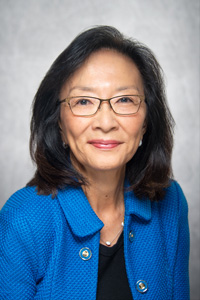
Sophia M. Chung, MD
Neuro-Ophthalmology Fellowship Director
Clinical Professor of Ophthalmology and Visual Sciences
Clinical Professor of Neurology
Sophia M. Chung, MD, joined the department in January 2020 after 6 months sabbatical as the Helen C Levitt Endowed Annual Visiting Professor. Previously, she held the Walter and Sharon Ryan Davisson Endowed Professorship of Ophthalmology at Saint Louis University School of Medicine in Saint Louis, MO, where she served for 30 years. She holds a second appointment in the Department of Neurology. She completed her residency in ophthalmology and fellowship in neuro-ophthalmology at the Cullen Eye Institute, Baylor College of Medicine. Dr. Chung is an Emeritus Board Director of the American Board of Ophthalmology, current Vice-Chair for the ACGME RRC for Ophthalmology, and Fellow of the North American Neuro-Ophthalmology Society having served on its’ board and numerous committees. Dr. Chung considers her greatest contribution to the field of ophthalmology to be the education of residents, medical students, and fellows. She has won 5 teaching and 3 best lecturer awards and was amongst the inaugural group of awardees of the Distinguished Teacher Award at Saint Louis University School of Medicine. She will continue her teaching endeavors and continue her research on optic nerve blood flow using laser speckle flowgraphy.
Randy H. Kardon, MD, PhD
Pomerantz Family Chair in Ophthalmology
Director, Iowa City VA Center of Excellence for Prevention and Treatment of Visual Loss
Professor of Ophthalmology and Visual Sciences
Randy Kardon MD, PhD, is tenured Professor of Ophthalmology, served as Director of the Neuro-ophthalmology Service for over 20 years, and has been faculty at the University of Iowa and Veterans Administration Hospitals for over 30 years. He holds the Pomerantz Family Endowed Chair in Ophthalmology and is Director of the Iowa City Veterans Administration Center for the Prevention and Treatment of Visual Loss, competitively funded by the Rehabilitation, Research and Development Division of the Veterans Administration. Dr. Kardon has published over 20 chapters, co-authored a textbook, and has published over 245 peer-reviewed journal articles. Dr. Kardon has been fortunate to have had continuous Federal grant funding for 30 years and is presently the Principal Investigator and Co-investigator on 4 major grants externally funded by the Veterans Administration, NIH, and the Department of Defense. Dr. Kardon currently teaches and mentors undergraduate students, medical students, residents and fellows and has received a University of Iowa Collegiate Teaching Award for his teachings and commitment to education, and is the current Neuro-Ophthalmology Fellowship Director. His main areas of current research interest include use of facial features to diagnose and monitor eye and neurological disorders, pupil physiology and its clinical application, diagnosis and treatment of light sensitivity and traumatic brain injury, and therapeutic interventions for preserving vision in blinding eye diseases. Dr. Kardon currently investigates structure-function relationships in the visual system using optical coherence tomography (OCT), ocular blood flow using laser speckle flowgraphy, image analysis, and MRI. Dr. Kardon is actively involved in the development of telemedicine tools for objectively evaluating the status of the visual and neurological systems for testing in remote locations and home testing.
Adriana Rodriguez Leon, MD
Assistant Professor of Neurology & Ophthalmology and Visual Sciences
Associate Residency Program Director of Neurology
Dr. Rodriguez Leon completed her medical school at the Universidad Central de Venezuela, in Caracas, Venezuela in 2012, and then completed a rural internship as an emergency and general physician. After moving to the United States in 2014, she did a research fellowship focused in neuropathic eye pain, at Bascom Palmer Eye Institute, at the University of Miami. She then moved to Iowa in 2017, where she completed a four-year residency in Neurology and subsequently a 2-year Neuro-Ophthalmology fellowship at The University of Iowa, which was completed in 2023. Her areas of expertise include treating diseases related to the optic nerve, optic pathways, high order visual function, ocular motility and a number of inflammatory and neurodegenerative diseases with ocular manifestations. She also has interest and expertise in diagnosing and treating headache disorders and facial pain.
Her primary research interests are focused on the study of photophobia in different headache and facial pain disorders, and on idiopathic intracranial hypertension, particularly on pulsatile tinnitus and venous flow, and how to develop objective clinical values to monitor disease progression and treatment response. Dr. Rodriguez Leon is a Board Certified Neurologist by the American Board of Psychiatry and Neurology (ABPN), member of the American Academy of Neurology (AAN), American Headache Society (AHS) and the North American Neuro-Ophthalmology Society (NANOS). She also has had collaborations with the Center for the Prevention and Restoration of Visual Loss (CPTVL) at the Iowa City VA Medical Center since 2022.
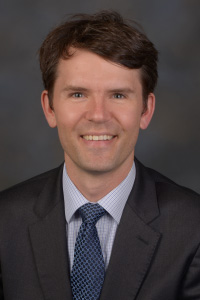
Edward F. Linton, MD
Assistant Professor of Ophthalmology and Visual Sciences
Dr. Linton completed his undergraduate and medical school at the University of Pennsylvania in Philadelphia. He then did his residency training in Ophthalmology at Vanderbilt in Nashville TN. He came to Iowa city in 2021 for a clinical neuro-ophthalmology fellowship, and then completed an additional year of research fellowship. His primary research interests are in structural and functional assessment of the visual system including new approaches to perimetry to improve reliability and access, integration of different imaging modalities including blood flow and OCT imaging, and deep learning approaches to image analysis.
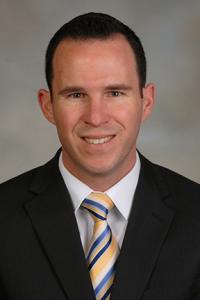
Matthew J. Thurtell, MBBS, MSc, FRACP
The Captain Jim and Donnita Gross Fund Professor
Director, Neuro-Ophthalmology Service
Associate Professor of Ophthalmology and Visual Sciences
Associate Professor of Neurology
Service Director, Dr. Matthew Thurtell, MBBS, MSc, joined our Department in December 2010, as Assistant Professor with a joint appointment in Ophthalmology, Neurology, and the Department of Veterans Affairs Medical Center. Dr. Thurtell trained in Neurology in Sydney, Australia under the mentorship of Dr. G. Michael Halmagyi, one of the most well-known experts in ocular motility and the vestibular system. Following his residency, Dr. Thurtell completed a two-year fellowship in Neuro-ophthalmology with Drs. John Leigh and Robert Tomsak at Case Western Reserve in Cleveland, Ohio. During his clinical fellowship in Cleveland, Dr. Thurtell continued to develop his expertise in eye movement and in the visual afferent system, with special interest in the pathophysiology and treatment of raised intracranial pressure as it pertains to the visual system. Dr. Thurtell then completed a third year of Neuro-ophthalmology fellowship at Emory University in Atlanta, Georgia under the direction and mentorship of Drs. Nancy Newman, Valerie Biousse, and Beau Bruce. Dr. Thurtell adds important expertise to our Iowa Neuro-ophthalmology Service in central and peripheral aspects of ocular motility physiology and pathology. He also continues his interest and expertise in the afferent visual system, including idiopathic intracranial hypertension.
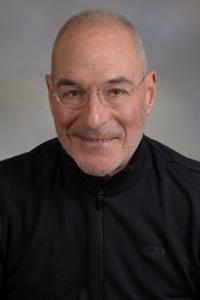
Michael Wall, MD
Professor of Ophthalmology and Visual Sciences and Neurology
Director, Iowa Visual Field Reading Center
Michael Wall, M.D. is a neurologist who trained as a neuro-ophthalmologist in Boston. Dr. Wall has been part of the Neuro-ophthalmology faculty at Iowa since 1991. Before that, he had been a neuro-ophthalmologist at Tulane University in New Orleans. Dr. Wall holds a secondary appointment in the Department of Neurology. He has a special clinical interest in increased intracranial pressure and its effect on vision. He was the principal investigator of the NIH funded Idiopathic Intracranial Hypertension Treatment Trial. Dr. Wall is also an expert on testing the visual fields and a respected investigator on the subtleties of this important test.
See our Faculty Research Interest Summaries
Current Fellows
Neuro-Ophthalmology Fellow Alumni
Recent Neuro-Ophthalmology Fellowship Graduates
2024
Yehudit Brody, MD
Lindsay Chun, MD, Private Practice, Los Angeles, CA
2023
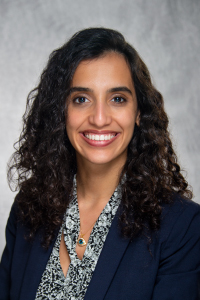
Salma Dawoud, MD, Oculoplastics Fellowship, Medical College of Wisconsin, Milwaukee, WI
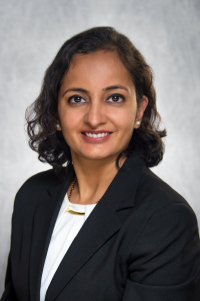
Natasha Gautam, MBBS, MS, Glaucoma Fellowship, Mayo Clinic, Rochester, MN
2022
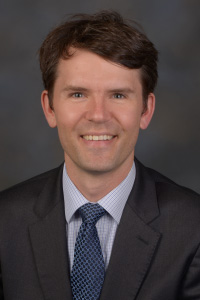
Edward Linton, MD, Faculty, University of Iowa, Iowa City, IA
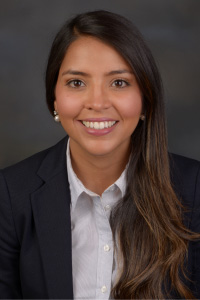
Adriana Rodriguez Leon, MD, Neurology Faculty, University of Iowa, VA Medical Center, Iowa City, IA
2021
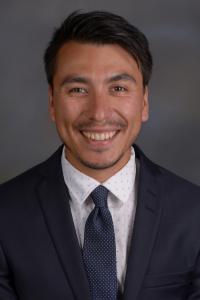
Luis Andre Leal Ferman, MD, Clinique Neuro Rive-Sud Hopital Charles-Le Moyne, Longueuil, Quebec, Canada
 Meet Dr. Luis Leal
Meet Dr. Luis Leal
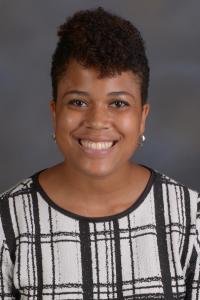
Alanna Tisdale, MD, MPH, Boston University, Boston
 Meet Dr. Alanna Tisdale
Meet Dr. Alanna Tisdale
2020
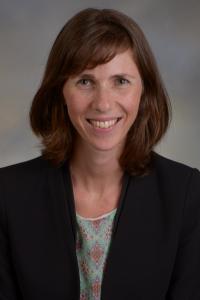
Nitsan Duvdevan-Strier, MD, Haifa, Israel (Research Fellow)
2019

Nitsan Duvdevan-Strier, MD, Haifa, Israel
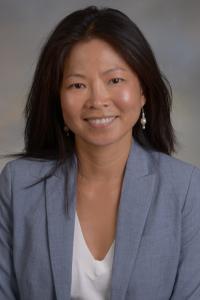
Melanie Truong, DO, OD, UT Southwestern Medical Center, Dallas, Texas
2018
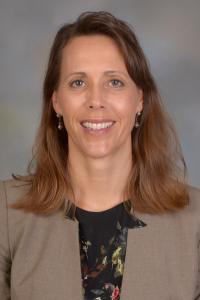
Jane A. Bailey, MD, Health Partners/Park Nicollet, Edina, Minn.
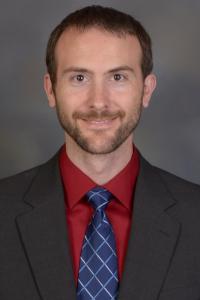
Lael J. Stander, MD, Colorado Springs Neurological Associates, Colorado Springs, Colo.
2017
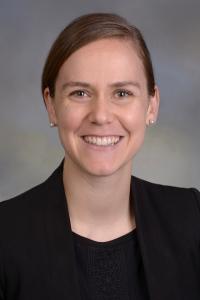
Johanna D. Beebe, MD, Nicollet Hospitals, Minneapolis, Minn.
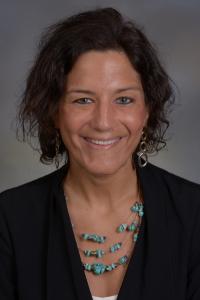
Shira S. Simon, MD, MBA, Northwestern Medicine, Chicago, Ill.
2016
Rachel Mercer, MD, Midwest Eye Care, Omaha, Neb.
2015
Enrique Rivera, MD, Caguas, Puerto Rico
2014
John J. (Joey) Brinkley, MD, LSU Health-Shreveport, Shreveport, La.
John J. Chen, MD, PhD, Mayo Clinic, Rochester, Minn.
2013
Kimberly Winges, MD, VA Medical Center/Oregon Health and Science University, Portland, Ore.
2012
Alethia Pantazis, MD, Vitality Medicine, Ocala, Fla.
2011
Yanjun "Judy" Chen, MD, PhD, University of Wisconsin, Madison, Wis.
Scott Haines, MD, Virginia Commonwealth University Health System, Richmond, Va.
2010
Travis C. Rumery, DO, Kellogg Eye Center, Madison, Wis.
2009
Mansoor S. Mughal, MD, Rutgers Medical School, New Brunswick, NJ
Fabiana C. Policeni, MD, Iowa City, Iowa
2008
Michael C. Johnson, MD, University of Alberta, Edmonton, Alberta, Canada
Colin J. Scott, MD, Illinois Eye Center, Peoria, Ill.
N. Troy Tagg, MD, Olney, Md., Washington, District of Columbia
All Neuro-Ophthalmology Fellow Alumni
Adeyinka Ashaye, MD, Ibadan, Nigeria—Neuro-Ophthalmology (1984-1985)
Pinar F. Aydin, MD, PhD, Ankara, Turkey—Neuro-Ophthalmology (1989-1990)
Paul Babikian, MD, Des Moines, Iowa—Neuro-Ophthalmology (-1984)
Jane A. Bailey, MD, Minneapolis, Minn.—Neuro-Ophthalmology (2017-2018)
Jason J. S. Barton, MD, PhD, Vancouver, British Columbia, Canada—Neuro-Ophthalmology (1990-1991)
Raymond A. Bell, MD, FRCS(C), Cobble Hill, British Columbia, Canada—Neuro-Ophthalmology (1976-1977)
Oliver Bergamin, MD, Tschugg, Switzerland—Neuro-Ophthalmology Research Fellow (2000-2002)
Pierre Bourgon, MD, Fort Myers, Fla.—Neuro-Ophthalmology (1976-1977)
John J. Brinkley, MD, Shreveport, La.—Neuro-Ophthalmology (2013-2014)
Jonathan C. Calkwood, MD, Golden Valley, Minn.—Neuro-Ophthalmology (1992-1992)
Bong Leen Chang, MD, Seoul, South Korea—Neuro-Ophthalmology (1976-1976)
John J. Chen, MD, PhD, Rochester, Minn.—Neuro-Ophthalmology (2013-2014)
Yanjun Judy Chen, MD, PhD, Madison, Wis.—Neuro-Ophthalmology (2009-2011)
Fiona E. Costello, MD, Calgary, Alberta, Canada—Neuro-Ophthalmology (2000-2002)
Terry A. Cox, MD, PhD, Columbia, S.C.—Neuro-Ophthalmology (1979-1981)
Jan S. C. Czarnecki, MD, Thunder Bay, Ontario, Canada—Neuro-Ophthalmology (1975-1976)
Kathleen B. Digre, MD, Salt Lake City, Utah—Neuro-Ophthalmology (1985-1987)
Sean P. Donahue, MD, PhD, Nashville, Tenn.—Neuro-Ophthalmology (1993-1994); Pediatric Ophthalmologty (1994-1995)
F. Jane Durcan, MD, Spokane, Wash.—Neuro-Ophthalmology (1986-1986)
Nitsan Duvdevan-Strier, MD, Haifa, Israel—Neuro-Ophthalmology (2018-2019, Research Fellow 2019-2020)
Julie Falardeau, MD, Vancouver, Wash.—Neuro-Ophthalmology (2001-2002)
Aldo Fantin, MD, West Bloomfield, Mich.—Neuro-Ophthalmology (1991-1992)
Syndee J. Givre, MD, PhD, Chapel Hill, N.C.—Neuro-Ophthalmology (1998-2000)
Steven L. Goldin, MD, Berkeley, Calif.—Neuro-Ophthalmology (2002-2003)
Scott R. Haines, MD, Richmond, Va.—Neuro-Ophthalmology (2010-2011)
Gerard L. Hershewe, DO, Reno, Nev.—Neuro-Ophthalmology (1989-1990)
Sung-Pyo Hong, MD, Daegu, South Korea—Neuro-Ophthalmology Visiting Research Fellow (1997-2000)
Daniel M. Jacobson, MD—Neuro-Ophthalmology (1986-1987)
Luke Qi Jiang, MD—Ocular Pathology (1981-1982); Neuro-Ophthalmology (1982-1984)
Mei-Qi Jiang, MD, Philadelphia—Neuro-Ophthalmology (1984-1987)
Michael C. Johnson, MD, Edmonton, Alberta, Canada—Neuro-Ophthalmology (2007-2008)
Aasim Kamal, MB, BS, Phoenix, Ariz.—Neuro-Ophthalmology (1999-2000)
Randy H. Kardon, MD, PhD, Iowa City, Iowa—Neuro-Ophthalmology (1987-1989)
Aki Kawasaki, MD, La Mont, Switzerland—Neuro-Ophthalmology Visiting Research Fellow (1993-1993)
Sachio Kawashima, MD, PhD, Okayama, Japan—Neuro-Ophthalmology (1994-1995)
Sonalee Kulkarni, MD, Arlington, Va.—Neuro-Ophthalmology (2003-2004)
Reid A. Longmuir, MD, Nashville, Tenn.—Neuro-Ophthalmology (2006-2007); Glaucoma (2007-2008)
Shannon C. Lynch, MD, Omaha, Neb.—Neuro-Ophthalmology (2004-2005)
Timothy J. Martin, MD, Winston-Salem, N.C.—Neuro-Ophthalmology (1990-1991)
Charles E. Maxner, MD, Halifax, Nova Scotia, Canada—Neuro-Ophthalmology (1985-1986)
Patricia J. McNussen, MD, Urbana, Ill.—Neuro-Ophthalmology (1987-1989)
John H. Mensher, MD, Seattle, Wash.—Neuro-Ophthalmology (1968-1969) — Glaucoma (1978-1979)
Aditya Mishra, MD, FRCS, Halifax, Nova Scotia, Canada—Neuro-Ophthalmology (1992-1993)
Mansoor S. Mughal, MD, New Brunswick, NJ—Neuro-Ophthalmology (2008-2009)
Michael L. Murphy, MD, Oconomowoc, Wis.—Oculoplastics (1994-1996); Neuro-Ophthalmology (1996-1997)
Richard K. Neahring, MD, Salem, Ore.—Neuro-Ophthalmology (1993-1994)
Alethia H. Pantazis, MD, Ocala, Fla.—Neuro-Ophthalmology (2011-2012)
Anil D. Patel, MD, FRCSC, Oklahoma City—Neuro-Ophthalmology (1996-1998)
Mary Lucy Pereira, MD, Pinecrest, Fla.—Neuro-Ophthalmology & Glaucoma (2000-2002)
Sydney F. J. Pilley, MD, Vancouver, British Columbia, Canada—Neuro-Ophthalmology (1974-1975)
Fabiana C. Policeni, MD, Iowa City, Iowa—Neuro-Ophthalmology (2008-2009)
Jane Z. Portnoy, MD, Narberth, Pa.—Neuro-Ophthalmology (1981-1982)
Michael J. Price, MD, Malden, Mass.—Neuro-Ophthalmology (1982-1983)
Sandeep Randhawa, MD, Livonia, Md.—Neuro-Ophthalmology (2005-2006)
Enrique J. Rivera, MD, Puerto Rico—Neuro-Ophthalmology (2014-2015)
Johane M. Robitaille, MD, Halifax, Nova Scotia, Canada—Pediatric Ophthalmology (1994); Neuro-Ophthalmology (1995)
Jacinthe Rouleau, MD, Montreal, Quebec, Canada—Neuro-Ophthalmology (2006-2007)
Travis C. Rumery, DO, Madison, Wis.—Neuro-Ophthalmology (2009-2010)
Paul C. Rutkowski, MD, Harrison, N.Y.—Neuro-Ophthalmology (1971)
Colin J. Scott, MD, Peoria, Ill.—Neuro-Ophthalmology (2007-2008)
Vinay A. Shah, MD, Oklahoma City—Neuro-Ophthalmology (2005-2006)
Shira Simon, MD, MBA, Chicago—Neuro-Ophthalmology (2016-2017)
Peter H. Spiegel, MD, Palm Desert, Calif.—Neuro-Ophthalmology (1995-1996)
Lael J. Stander, MD, Colorado Springs, Col.—Neuro-Ophthalmology (2017-2018)
N. Troy Tagg, MD, Olney, Md.—Neuro-Ophthalmology (2007-2008)
Denise Taylor, MD, St. Louis—Neuro-Ophthalmology (1980-1981)
Melanie Troung, DO, OD, Dallas—Neuro-Ophthalmology (2018-2019)
Joel M. Weinstein, MD, Hershey, Pa.—Neuro-Ophthalmology (1978-1979)
William N. White, II, MD, Perry, N.Y.—Neuro-Ophthalmology (1993-1994)
Kimberly Winges, MD, Portland, Ore.—Neuro-Ophthalmology (2012-2013)
David H. Zackon, MD, Ottawa, Ontario, Canada—Neuro-Ophthalmology (1981-1982)
Ronald M. Zahoruk, MD, FRCS—Neuro-Ophthalmology (1971)
Thomas J. Zweifel, DO, Sheboygan, Wis.—Neuro-Ophthalmology (1978-1979)
Contact Us
Mailing Address:
Sophia Chung, MD
Neuro-Ophthalmology Fellowship Director
Department of Ophthalmology
200 Hawkins Dr. Iowa City, IA 52242-1091
E-Mail:
Ramona Weber, Fellowship Coordinator
email: ramona-weber@uiowa.edu
telephone: (319)356-1951
Ophthalmology Fellowship Director
Alina Dumitrescu, MD, FACS
University of Iowa Health Care
Ophthalmology and Visual Sciences
200 Hawkins Drive
Iowa City, IA 52242-1091
Email: alina-dumitrescu@uiowa.edu
Ophthalmology Fellowship Coordinator
Tonya Looker
University of Iowa Health Care
Ophthalmology and Visual Sciences
200 Hawkins Drive
Iowa City, IA 52242-1091
Email: tonya-looker@uiowa.edu
Phone: 319-356-2921
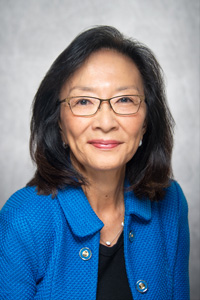
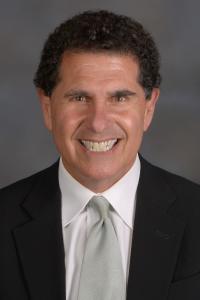
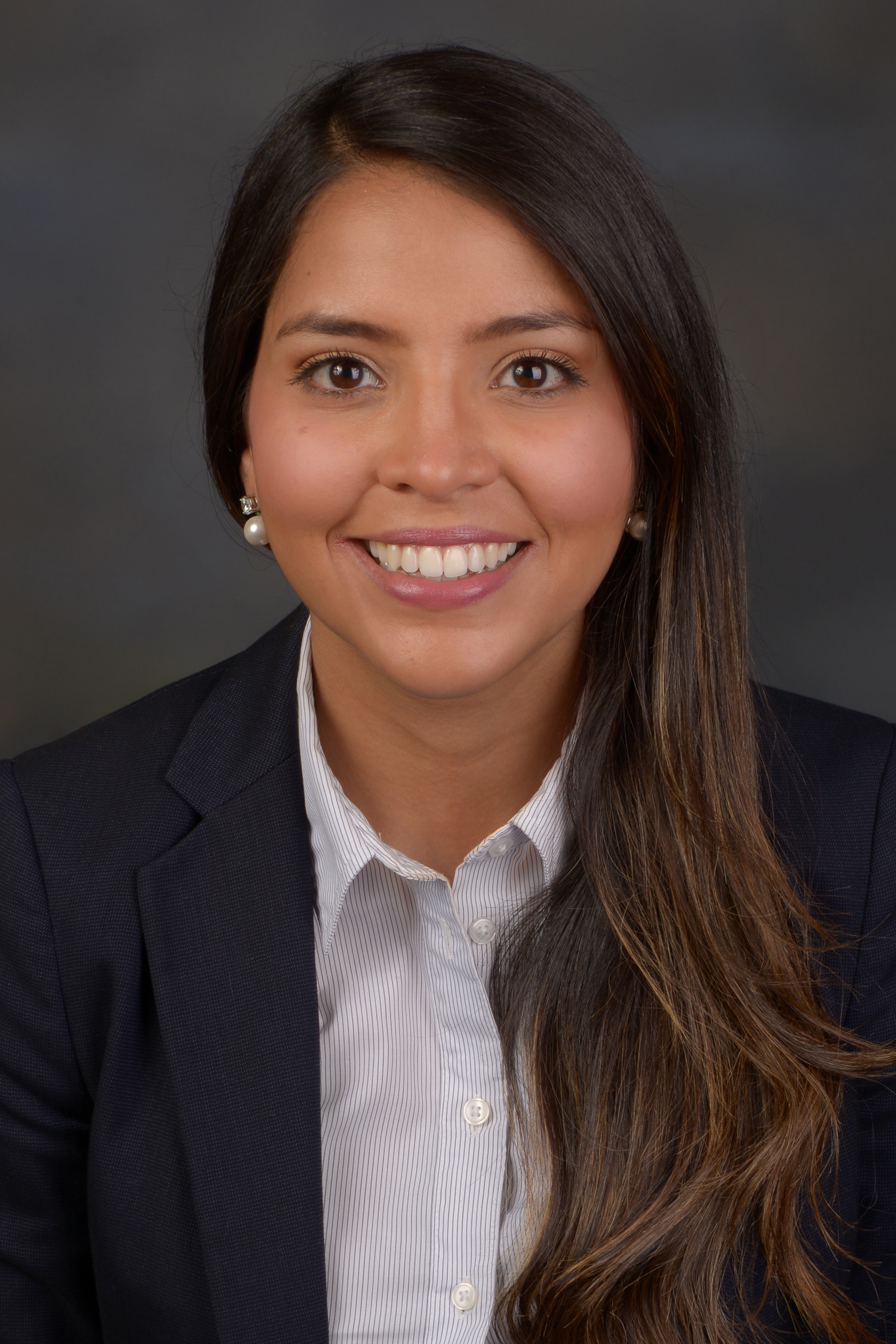
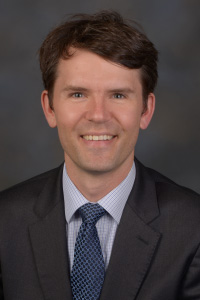
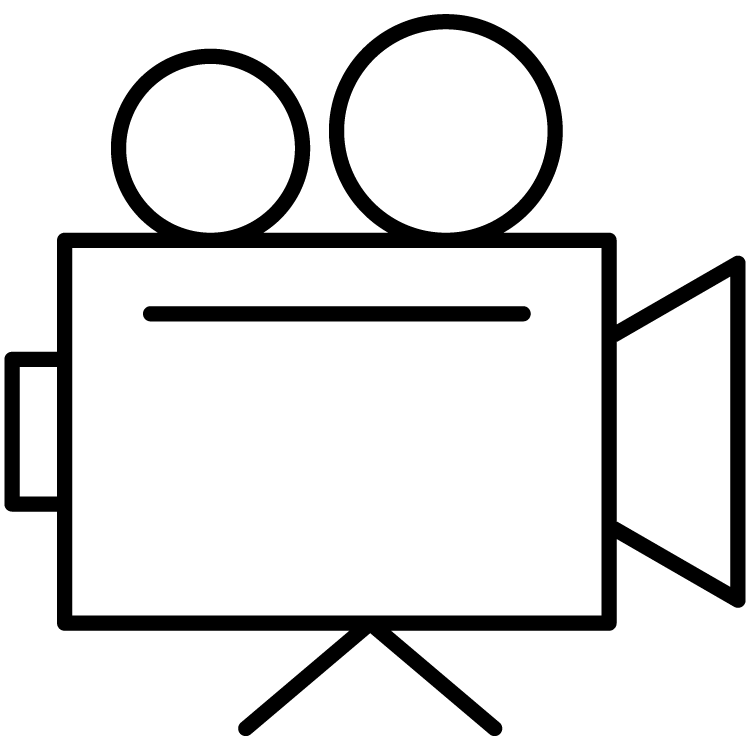 Meet Dr. Sophia Chung
Meet Dr. Sophia Chung